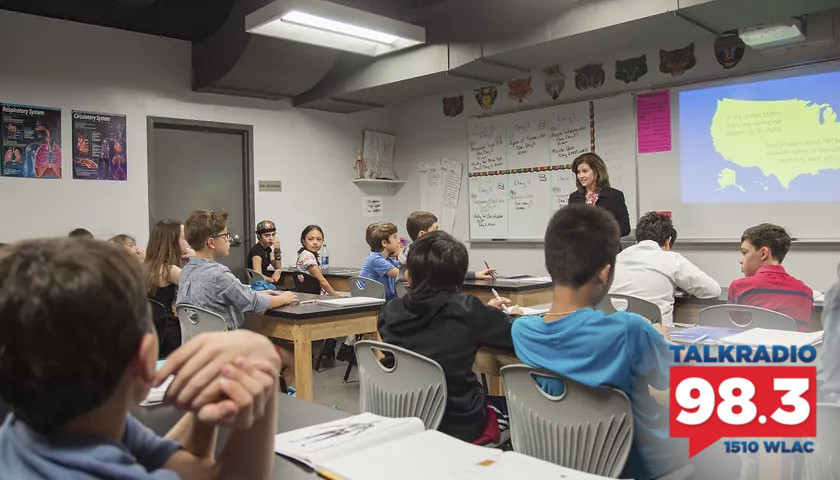Live from Music Row Tuesday morning on The Tennessee Star Report with Michael Patrick Leahy – broadcast on Nashville’s Talk Radio 98.3 and 1510 WLAC weekdays from 5:00 a.m. to 8:00 a.m. – host Leahy welcomed previous phone guest, Dad Gone Wild blogger TC Weber, in the studio to discuss his journey to Nashville and his perspective on Metro Nashville K-12 public schools.
Leahy: We welcome to our studios for the very first time TC Weber, who blogs as Dad Gone Wild about K-12 public school education here in Nashville, Tennessee. Good morning, TC.
Weber: Good morning. Thanks for having me. It’s always a pleasure to be here.
Leahy: Well, we’re delighted to have you. So you, sir, are an education troublemaker, are you not? You are here pointing out how miserable K-12 public education is in Metro Nashville Davidson County, and the powers that be don’t like that, apparently.
Weber: No, it’s never been popular. It’s gone through all kinds of changes, and I try not to be a troublemaker. I’ve tried to move on to the positive more than once.
Between Shawn Joseph and then on to now, Penny Schwinn, it seems like I always end up dealing in the muck instead of the positive.
Leahy: So, Shawn Joseph, just for our listeners who may not remember him – many people have tried to forget him – was the school director here who preceded Adrienne Battle. He was here for what, a hot minute?
Weber: He was here almost three and a half years. His initial contract was four years and he never made it all the way through. But he did manage to make sure some friends made some money.
Leahy: Pretty much that’s the case, and that’s why he’s no longer here. And one of the reasons why.
Weber: It’s a major reason why he’s not here, because he was doling out contracts without oversight. He was running human resources without oversight. And eventually, people went, the story is not as good as we thought.
Leahy: You did a lot of reporting on this, that’s your blog, Dad Gone Wild.
Weber: Yes, we did a whole lot of reporting. We were the first ones to draw attention to the fact that the people around him all had, how do we put it, questionable records in their past – whether they’ve been arrested and whether there were questions about financial management.
It’s one of those things that all of a sudden you’re looking at the staff and you’re going, oh, wait a minute, 8 out of 10 people have had problems before. Why are they here? Why are we importing troublemakers from somewhere else to come to take advantage of Tennessee?
Leahy: You’ve lived in Nashville since the ’90s, correct?
Weber: I got here in 1989. Borrowed $700 from my father and took a job on Music Row just a couple of blocks from here, Curb Records building. And got here, and the guy I was working for was a guy named J.D. Haas. He was a promoter.
And J.D. said, ah, you came. And I said I did. And he said, well, we got a discussion here we have to have about a cash flow that I have.
And they were in the radio promotion business. They were selling country music and he did not have the flow of cash that he thought he did. And I had a choice.
Leahy: He couldn’t pay you.
Weber: Couldn’t pay me. Not regularly at the beginning, but he wanted to.
Leahy: He had the desire to pay you.
Weber: He had a deep desire, and I had a choice to either go home and tell my parents I was wrong or figure out how to make it here. And I’ve been here ever since.
Leahy: You’re from northeast Pennsylvania.
Weber: Northeast Pennsylvania.
Leahy: And I’m an upstater from upstate New York. So we’re kind of northern. I arrived here I arrived in 1991. Right now you have children who are in K-12 public schools here.
Weber: I have two children at school, and I have a wife who is a teacher in Metro Schools. My kids are both at Oliver, and my wife is a teacher also, in middle school.
Leahy: What’s your general complaint about the K-12 public schools here in Metro Nashville?
Weber: I think, first of all, we don’t pay enough. We don’t listen to the people that are actually doing the work. It’s amazing that education is the only field that the further away you move from kids, the more money you can make.
So we don’t pay attention to teachers. We give them a lot of lip service. I like to say this whole Larry Arnn thing with Hillsdale College, everybody got upset by what he said, but the reality is we live what he said every day towards teachers.
We need to pay more attention to them. We need to communicate more with parents. I think there’s a distinct lack of communication.
We love our parents to be involved as long as they’re doing bake sales, car washes, and PTO, but when they have any other kind of questions, well, then they’re interfering.
Leahy: Yes, I think that’s generally the case. Overall, K-12 public schools’ performance in Metro Nashville has been anemic at best, would you say?
Weber: It hasn’t been as good as it can be. And I think there’s a number of reasons why that is. I’m also not sure we’re using the right yardstick. There are questions about the test and what it actually measures. There are questions about, as we move into, what is this, the 21st century?
Are we measuring things that were important a decade or more ago, or are we measuring things that students will need in the future? Are we providing all of that? And is it accurate? So the testing as much as a question as anything.
Listen to today’s show highlights, including this interview:
– – –
Tune in weekdays from 5:00 – 8:00 a.m. to The Tennessee Star Report with Michael Patrick Leahy on Talk Radio 98.3 FM WLAC 1510. Listen online at iHeart Radio.






Academic Administration is worse than organized crime.
And I had thought that they were one and the same.